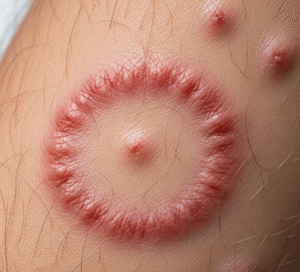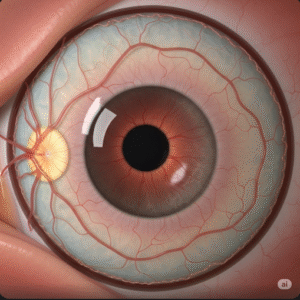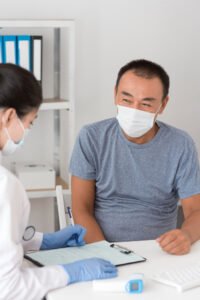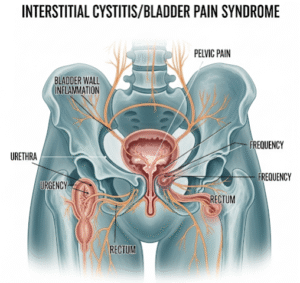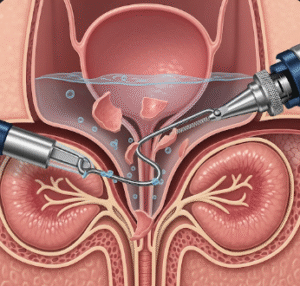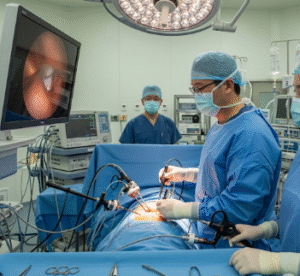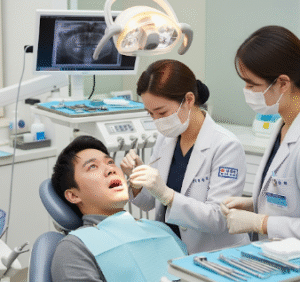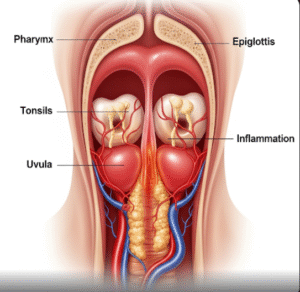What it is
Chorionic Villus Sampling (CVS) is a prenatal diagnostic procedure used to detect genetic and chromosomal abnormalities in a developing fetus. It involves collecting a small sample of placental tissue (chorionic villi) for laboratory analysis. Since the placenta shares the baby’s genetic makeup, it allows specialists to identify conditions such as:
➤ Down syndrome (trisomy 21)
➤ Cystic fibrosis
➤ Thalassemia
➤ Other inherited disorders
➡ CVS is usually performed between 10–13 weeks of pregnancy, making it one of the earliest options for prenatal diagnosis compared to amniocentesis.
Why it’s done
CVS is recommended when there’s an increased risk of genetic disorders. This could be due to:
✔ Advanced maternal age (35 or older)
✔ Family history of genetic disease
✔ Abnormal ultrasound results
✔ Positive screening tests
✔ Previous child with genetic condition
➡ The main advantage: Early detection of abnormalities, giving parents time to make informed decisions about the pregnancy.
Alternatives
CVS is not the only option. Other methods include:
➤ Amniocentesis (done at 15–20 weeks; uses amniotic fluid)
➤ Non-Invasive Prenatal Testing (NIPT) (blood test, no risk to fetus, highly accurate for common chromosomal disorders)
➤ Ultrasound scans (help detect structural abnormalities but not always genetic issues)
Note: Each method has its own pros and cons. For example, CVS provides earlier results, but slightly higher risk of miscarriage compared to amniocentesis.
Preparation
Before undergoing CVS in Korea, preparation usually involves:
➡ Genetic counseling session – explaining the risks, benefits, and limitations
➡ Detailed ultrasound – to confirm pregnancy stage and placental location
➡ Maternal health check – blood pressure, medical history, infection screening
➡ Informed consent – understanding potential risks like infection, bleeding, or miscarriage
✔ Patients are generally advised:
- To eat normally before the test
- To avoid applying creams/oils on the abdomen (if abdominal CVS is planned)
- To arrange someone for support after the procedure
How it’s done
CVS can be performed in two main ways, both guided by real-time ultrasound:
➡ Transcervical CVS
- A thin catheter is passed through the cervix to collect chorionic villi.
- Usually chosen if the placenta is located lower.
➡ Transabdominal CVS
- A thin needle is inserted through the abdominal wall into the placenta.
- More common and less discomfort for some patients.
Both methods take only 10–20 minutes. The tissue sample is then sent for genetic analysis.
Highlights during the procedure:
✔ Local anesthesia is rarely needed.
✔ Mild cramping or spotting can occur afterward.
✔ Results are available in 7–14 days.
Recovery
After CVS, patients are usually monitored for a short time and then discharged the same day.
Post-procedure instructions:
➡ Rest for 24 hours; avoid heavy lifting and strenuous activity.
➡ Expect mild cramping or spotting – usually harmless.
➡ Contact doctor if experiencing:
- Heavy bleeding
- Severe abdominal pain
- Fever or fluid leakage
✔ Risks:
- Miscarriage risk is about 0.5–1%.
- Rare complications include infection or Rh sensitization (preventable with Rh immunoglobulin).
Treatment Options in Korea
South Korea is renowned for advanced prenatal care and genetic testing facilities. CVS is widely available at major hospitals and fertility clinics, especially in Seoul.
Why consider CVS in Korea?
➤ Highly trained specialists in maternal-fetal medicine.
➤ State-of-the-art ultrasound and laboratory facilities.
➤ Shorter waiting times compared to some countries.
➤ Availability of comprehensive counseling services in multiple languages.
Hospitals & Clinics offering CVS in Korea include:
✔ University-affiliated hospitals (Seoul National University Hospital, Yonsei Severance, Asan Medical Center).
✔ Private women’s hospitals specializing in prenatal diagnosis and fertility treatments.
✔ Medical tourism programs that offer CVS along with genetic counseling in English.
Costs & Insurance:
➡ Costs vary between USD 800–2000 depending on the hospital and additional tests.
➡ Some insurance may partially cover if medically indicated.
Key Highlights
✔ CVS = early genetic diagnostic test during pregnancy
✔ Done at 10–13 weeks, earlier than amniocentesis
✔ Indications: high maternal age, family history, abnormal screening results
✔ Alternatives: Amniocentesis, NIPT, Ultrasound
✔ Risks: miscarriage (~1%), infection, bleeding
✔ Recovery: Rest, avoid strenuous activity, monitor for complications
✔ In Korea: Advanced facilities, expert doctors, accessible for international patients


